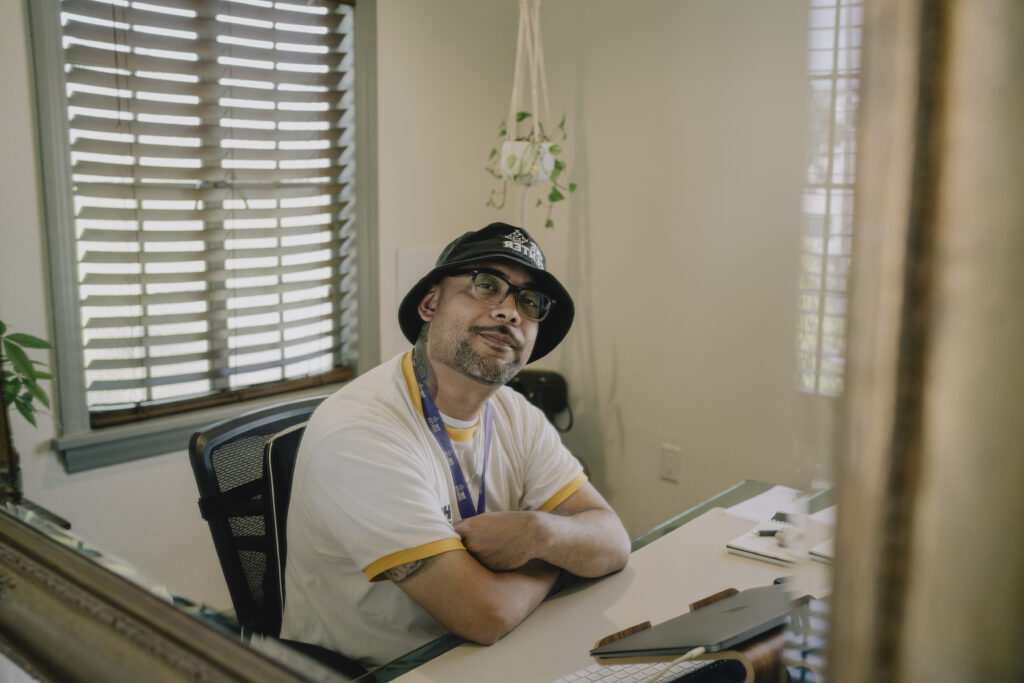Many homeless service providers are motivated by a desire to do meaningful work. However, they often struggle to sustain careers in this field due to restricted funding, training and mental health resources. To effectively address homelessness in Los Angeles, our frontline workers need support to build sustainable careers and continue their vital work.
“Housing alone is not going to solve homelessness for our most unwell and our chronically homeless folks,” said Alex Soto, executive director of The Center in Hollywood, a nonprofit dedicated to ending homelessness in Los Angeles. “If we really want to end chronic homelessness, we need to invest in a workforce who can support our neighbors on a day-to-day basis.”
Research finds that burnout and turnover remain high among people who work for homeless service providers. This work can be emotionally taxing and organizations don’t always have the flexible funds available to support their staff with the proper resources. As a 2023 study from the National Alliance to End Homelessness found, 74 percent of homeless services employees said their organizations were understaffed and almost half reported feeling overworked.
That’s why, as part of our Homelessness Initiative, the Conrad N. Hilton Foundation launched the HOPICS Employee Equity Fund Program to support the transformative work of the Homeless Outreach Program Integrated Care System (HOPICS), one of the largest housing and homeless service agencies in Los Angeles County.
“Our staff are our greatest asset, and we as an agency do everything we can to support them,” said Ben Kay, associate director of access and triage for HOPICS. “We’re constantly trying to recognize our staff and we have different programs that do that.”
Learn more about the importance of staff wellness in ending homelessness and how we’re supporting the people changing lives in this sector every day.

The homeless services workforce needs the resources and support to help them tackle this challenging work and maintain their own well-being. Only then can they best show up to help others. Still, this remains a challenge for many. According to the National Alliance to End Homelessness’ survey of the field, 71 percent of homeless services employees said their organizations experience high turnover. Respondents attributed this to increased stress, being overworked, and having limited opportunities to advance their careers.
After all, many organizations remain underfunded, leaving staff members to stretch themselves too thin and enter the workforce without proper training or compensation. In fact, 44 percent said they worry about paying for their own needs like housing.
“We’ve, over the years, slowly built a lot of programs designed at protecting our frontline workers,” Soto said. “Folks are still burning out because this work is hard and folks are still significantly underfunded and lack a lot of access to the proper mental health support to process all that they’re seeing every day.”
As these staff members know, they’re not the only ones affected by lack of funding and support. Ultimately, the overall mission of solving homelessness suffers as a result: 75 percent said high turnover disrupts their services and 63 percent said it hurts their ability to build relationships with clients.
To do their jobs most effectively, 47 percent said they need more time to rest and recharge and 30% said they need more training opportunities. Clearly, it will be difficult to make measured progress in the fight to end homelessness until these team members receive the resources they need to fully succeed in their roles.
The Hilton Foundation is funding innovative programs to help homeless service providers improve staff wellness. The HOPICS Employee Equity Fund, for example, is designed to support HOPICS’s efforts, which serve 36,000 people each year throughout Los Angeles County.
Through this grant, HOPICS will implement a robust training and mentorship program to build managers’ leadership skills and improve attrition. The grant will also enhance employee wellness and wellbeing by supporting more than 50 staff members facing immediate financial crises. Additionally, it will fund a chaplaincy program to provide spiritual care counseling to employees dealing with client incidents and deaths.
“We’re trying to show our employees, ‘We see that you’re human first. And we want to support you as a human being — one, so that you can thrive personally, but also so that you can come to work fully equipped,” said HOPICS director Veronica Lewis.
The Hilton Foundation remains committed to supporting the people who are working hard to implement both preventative and permanent solutions to homelessness. Recognizing that solving homelessness requires dedicated time and resources, an effective workforce is crucial to Los Angeles’ goal of making homelessness rare, brief and one-time.